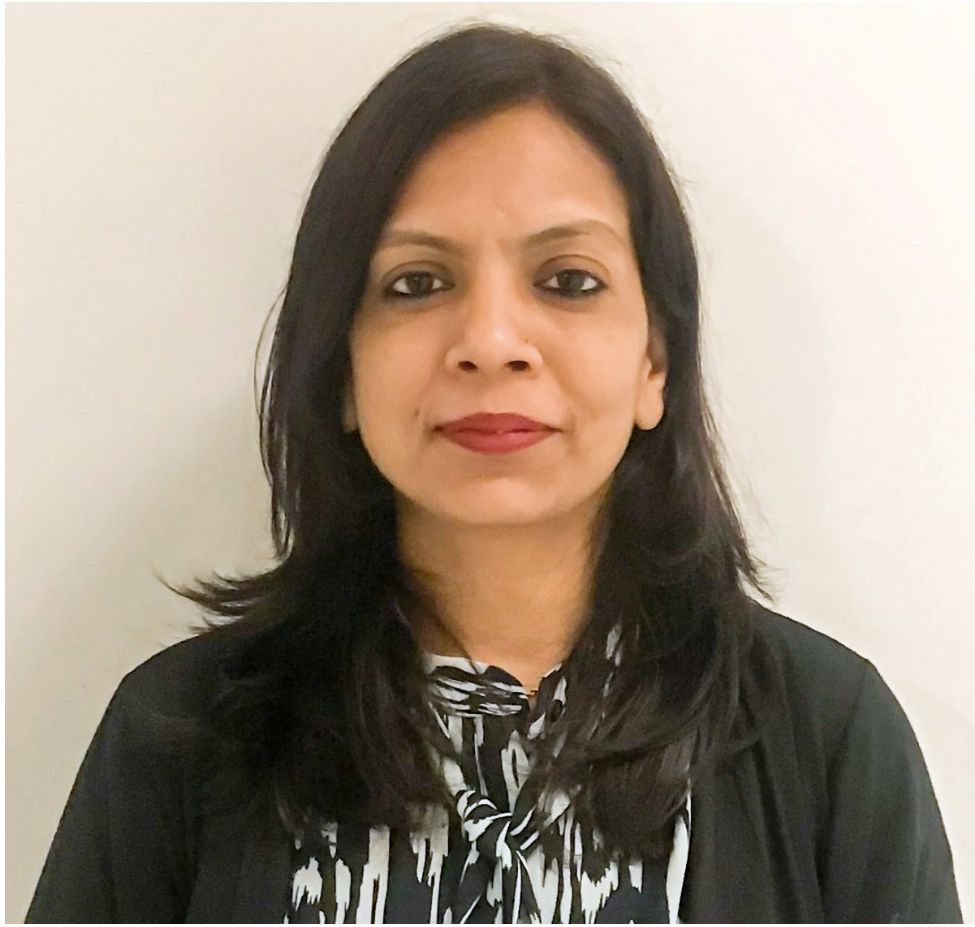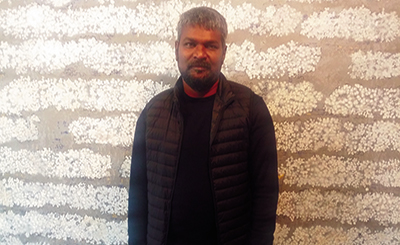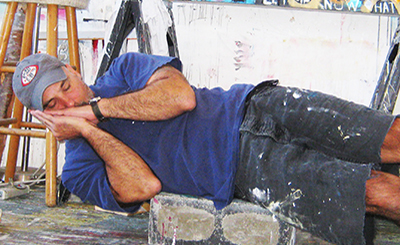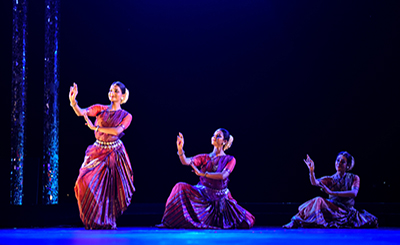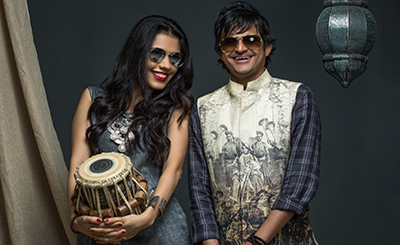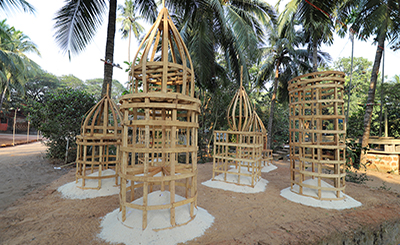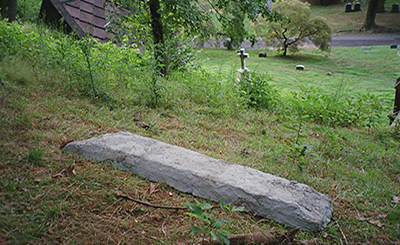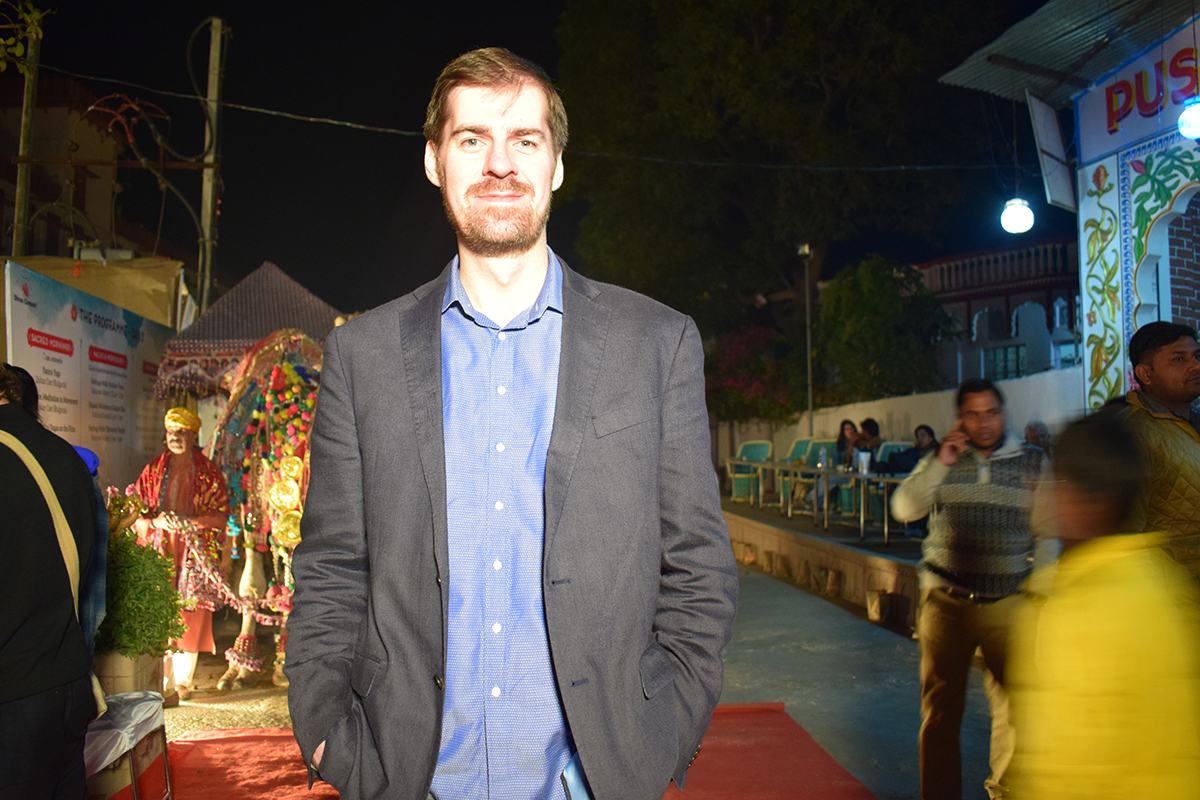
Simon Thacker at The Sacred Pushkar. Photo: Shireen Quadri
Scottish guitar virtuoso and composer Simon Thacker, who performed at The Sacred Pushkar in December 2017, on reimagining musical landscapes and reinventing ragas
Scottish composer and guitar virtuoso Simon Thacker is the leader of some of today’s most prescient ensembles. His group, Simon Thacker’s Svara-Kanti, is a world leading Indo-Western collective that has seen him tour and premiere new work at major festivals in India, Pakistan and Bangladesh. Svara-Kanti’s debut album, Rakshasa, came out in 2013 and has been critically acclaimed.
Thacker is also the leader of and composer for Simon Thacker's Ritmata, featuring three of Europe’s finest jazz/world musicians: Paul Harrison (piano), Mario Caribe (bass) and Stu Brown (drums). They toured New Zealand in 2015 and are currently recording their Creative Scotland-supported debut album.
In association with Polish cellist Justyna Jablonska, he has just released the new Karmana album, featuring Simon’s six movement Karmana suite for guitar and cello, reimagined Gaelic, Romany and Polish music, one of the most advanced ever uses of backwards recording and special guests Karine Polwart (Scots song), Masha Natanson (Romany song) and Sarvar Sabri (tabla).
Thacker is also classical guitar tutor at Edinburgh College and Edinburgh Napier University. He recently performed at The Sacred Pushkar in December 2017, organised by Sanjoy Roy's Teamwork Arts and presented by by Shree Cement.
In this interview, Thacker says that music, to him, is life. “It is a journey of self-discovery. I have always felt that what has been discovered musically thus far to transmit our deepest feelings and emotions is but a scratch on the surface of what is possible. I have many visions of new possibilities, and my compositions, ensembles and collaborations are the means of my journey to realise these,” he says. Excerpts from an interview:
Shireen Quadri: A guitar soloist, composer and leader of the ensemble, Svara-Kanti, world’s leading Indo-Western collective, you have been touring the world. Tell us about how you go around preparing for performances in each of the big cities?
Simon Thacker: “Simon Thacker’s Svara-Kanti” is my vehicle for expanding on traditions from the Indian subcontinent, and for creating new soundworlds by absorbing the aspects of each tradition that moves me most. It is a collective that changes lineup depending on the programme focus (Carnatic, Baul, Punjabi, totally new instrumental music, and so on). Each international performance has been different, with contrasting preparation. For example, the first time I toured India, in 2014, I brought a UK-based lineup which had toured constantly for a couple of years, but I added Baul singer Raju Das Baul as a guest for two songs. So my preparation for that involved going to Santiniketan to meet Raju, choose songs and rehearse, reimagining the music while I was in its heartland, before joining the rest of the group.
When the group played in Dhaka in 2016 (to 60 000 people in the Army Stadium for the International Folk Fest), I brought what had by then become a fully fledged Baul programme and this time I added Kushtia-based Baul singer Farida Yasmin for two songs, with only 48 hours to create the music from scratch! As I’m used to creating under pressure in remarkably tight timescales, I could draw on my immersion in the tradition over so many years to pull it off with great success. For my Pakistan tour in 2015, I reimagined a famous popular song, making it more dramatic and closer to a classical tradition, so preparation was mainly this recomposition. For The Sacred Pushkar (a Teamwork festival) in 2017, I simply had to choose the best programme for the stunning open air lake side setting.
Shireen Quadri: Svara-Kanti’s 2013 debut album, Rakshasa, has been getting great reviews. Tell us about its making. What aspects of the two traditions — East and West — did you focus on?
Simon Thacker: Rakshasa attracted 50 great reviews from around the world from publications spanning an array of genres (Indian, jazz, experimental, world, classical, even rock), showing how boundary demolishing it was. Whereas the album we will be releasing next year, Trikala, is one compositional voice (me) and many performers from different traditions, Rakshasa was the same four performers interpreting four very different composers. The music spanned classical Carnatic, Hindustani and Dhrupad influences to Punjabi folk (Surinder Kaur, Narinder Biba) transformed, and finally the title track depicting the demons of the Ramayana through my own invented raga and a development of the backwards recording technique pioneered by Jimi Hendrix and The Beatles.
Simon Thacker with Raju Das Baul (right). Photo: Shireen Quadri
Shireen Quadri: The group’s next album will be released next year. What is it going to be about?
Simon Thacker: Trikala will be released in June and it is an epic double album. It is designed, rather modestly (!), to be the most advanced Indo-Western release up to this point. On the first CD, there are instrumental pieces that reveal what I regard to be the most prescient realisation of the musical language I have been developing, that goes beyond notions of “Indian” and “Western” to truly occupy its own space. I think of this not as “fusion”, which is often a simplification or amalgamation, but as a new classical tradition, an evolution of tradition. This features Grammy Award-winning tabla maestro Sukhvinder Singh Pinky and incredible violinist Jackie Shave. There are also radical Punjabi folk reimaginings (my vision for contemporary Punjabi music) and two tracks with leading Carnatic percussionists. The second album consists of my reimaginings of both Indian and Bangladeshi Baul songs with Raju Das Baul and Farida Yasmin and my instrumental compositions using the Baul string instrument khomok in new ways with classical guitar and tabla. So, there are Hindustani (North), Carnatic (South), Punjabi (West) and Baul (East) traditions transformed and enriched with new layers and new music that is beyond categorisation. I’m confident that it will prove to be an important milestone in intercultural music.
Shireen Quadri: You are also the leader and composer for Ritmata, which also features three of Europe’s finest jazz/world musicians: Paul Harrison (piano), Mario Caribe (bass) and Stu Brown (drums). Tell us about the debut album of the group that you are currently working on?
Simon Thacker: Simon Thacker’s Ritmata is my longest running group (since 2006) and has developed into what I call my musical laboratory. I draw on inspirations as diverse as Native American Pow Wow, 13th century Spanish miracle songs, Dagestani Mountain Jewish and Sufi traditions to write original music for the incredible abilities of the musicians, who can realise any score no matter how demanding and improvise near telepathically. The album is kindly supported by Creative Scotland and also features two special guest singers from unique traditions, but as it is not coming out until summer next year, everything is still under wraps. I promise it will be spectacular and will add new dimensions to the soundworld of the classical guitar!
Shireen Quadri: With Polish cellist Justyna Jablonska, you have also released the Karmana album featuring your six-movement Karmana suite for guitar and cello, reimagined Gaelic, Romany and Polish music, one of the most advanced ever uses of backwards recording and special guests Karine Polwart (Scots song), Masha Natanson (Romany song) and Sarvar Sabri (tabla). Tell us about the album.
Simon Thacker: Karmana is a Sanskrit word meaning “performing anything by means of magic” and explicitly seeks to explore what makes certain sounds and music moving and transformative. It is inspired by the belief in music as a means of transcendence. There are always two strands to my work: explicitly new original music coming straight from my subconscious and often radical reimaginings of traditional material. These two strands infuse and drive each other on: traditions transmit creative spirits and learning from the past, the original new music propulses me forward and gives me new means of transforming myself and the pre-existing material. So it features new instrumental music written for my long time duo partner Justyna Jablonska on cello, which we have toured extensively, as well as a new vision for Scots, Gaelic, Polish and Roma Gypsy song, as well as an explosive trio for cello, guitar and tabla.
Shireen Quadri: 2016 saw the premiere of your Songs of the Roma, the new Romany musical journey, at the Made in Scotland showcase in the Edinburgh Fringe Festival with Justyna Jablonska and Masha Natanson. Tell us about the experience.
Simon Thacker: The spiritual home of the Romany people is India and I have such an affinity with traditions from Rajasthan. Justyna has Roma ancestry and we both love Roma music, so an exploration of this tradition, with me adding new layers to what is one of the world’s great song repositories, seemed a natural next step for us. Masha had guested on the Karmana album and it worked so well that I always intended to create a whole programme for this combination. She has a stunningly emotive voice. We were chosen to represent Scotland at the prestigious Made in Scotland showcase at the world’s biggest arts festival, the Edinburgh Festival Fringe, in 2016 which gave me the perfect opportunity to do so. We will be touring widely in 2018 and releasing our first album, with me transforming songs in Roma, Romanian, Serbian, Russian and Polish, as well as creating virtuoso instrumental music.
Shireen Quadri: You teach classical guitar at Edinburgh College and Edinburgh Napier University. Tell us about your own influences?
Simon Thacker: Teaching keeps you grounded and in touch with parts of your own formation and journey that you might otherwise forget, as well as makes you constantly re-evaluate every aspect of your art and music in general. My particular journey has been one of a multitude of simultaneous paths that have fed my evolving musical world, which has allowed me to connect with musicians from wildly different backgrounds to my own. My formal classical university and conservatoire training was always allied to exploring the path and evolution of ideas, forms, inspirations and genres across the world, including Indian traditions, flamenco, North Africa, Native America and so on. I played in a jazz quintet and big band at uni and a rock band in high school. My classical education and immersion in masterworks by Bach, Britten, Rodrigo and all the greats gave me the means to explore and absorb in order to create the musical world I want to hear and want people to experience.
Shireen Quadri: What aspects of the folk, classical and spiritual forms of the Indian subcontinent fascinate you?
Simon Thacker: The Indian subcontinent offers so much to explore. The classical traditions, which I have listened to since I was 13, are perfectly complimentary to Western pre-early 20th century classical music in that they use the same raw materials of music in almost the exactly opposite way (complexity of simultaneous notes in harmony vs the highly developed raga system, the movement of sa but fewer scales vs an unchanging drone and a cornucopia of scales, etc). There are many aspects of Indian classical traditions that I came to realise are naturally part of my musical language, in more or less literal ways, for example the Carnatic rhythmic system. In spiritual and folk traditions, such as Baul, Sufi, Punjabi, I found an energy, aesthetic and directness of expression that matches my own quest perfectly. This connection is deeply embedded, spiritual and emotional, beyond words. My music explains it more eloquently than my prose.
Shireen Quadri: What do you think lies at the root of your expansive compositions? What are some of the things that shape your compositions?
Simon Thacker: Music to me is life. It is a journey of self discovery. For as long as I can remember, I was never satisfied with the status quo and always felt deeply that what has been discovered musically thus far to transmit our deepest feelings and emotions is but a scratch on the surface of what is possible. I have many visions of new possibilities, and my compositions, ensembles and collaborations are the means of my journey to realise these.
Shireen Quadri: Your oeuvre is marked by a certain intricacy and depth of understanding. What do you turn to for inspiration? What do you think lends your compositions their intensity?
Simon Thacker: Inspiration comes in many forms and I find it is best not to analyse its origin too much, but I believe that the more disparate sources, from every art form (I love dance, visual art and theatre for example), the more deep connections you make with people on a similar journey, the more positive influences then the more likely inspiration is to flow through you. Your mind and subconscious needs to be fed and connected with creative spirit. If you do this, at a certain point, usually unexpectedly, it just blurts something out and that might prove to be your greatest ever composition. The intensity of my music, which is often commented on, is simply a reflection of my personality. I prefer rawness, directness and unfettered expression.
Shireen Quadri: What are you currently working on?
Simon Thacker: Trikala by Simon Thacker’s Svara-Kanti will be released in early summer after I finish recording (there will also be lots of videos recorded for my YouTube channel) in Kolkata and Chennai in February. The Simon Thacker’s Ritmata new album will be entering a new phase in March and Songs of the Roma will tour and record a new album in April and May for release at the end of 2018. It will be a busy start to the year!
More from Arts
Comments
*Comments will be moderated



